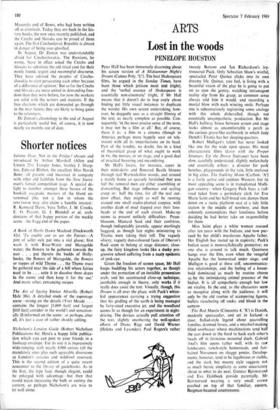Lost in the woods ARTS
PENELOPE HOUSTON
Peter Hall has been immensely disarming about his screen version of A Midsummer Nights Dream (Cameo Poly, `U'). The best Shakespeare firms, he argued in the Sunday Times, have been those which jettison most text (right), and the 'verbal essence of Shakespeare is essentially non-cinematic' (right, if Mr Hall means that it doesn't do to hop coyly about finding pat little visual instances to duplicate the words). His own screen undertaking, how- ever, he doggedly sees as a straight filming of the text, as nearly complete as possible. Con- sequently, 'in the most precise sense of the term, it may not be a film at all.' But, of course, there it is: a film in a cinema (though in America perhaps more happily seen on tele- vision) with all its imperfections on its head. Part of the trouble, no doubt, lies in a kind of theoretical grasp of what ought to work in Tv, the movies, or on stage, and a good deal of practical havering and meandering.
Mr Hall's lovers, for instance, caper in their mini-skirts and flowered Beatle blouses through real Warwickshire woods, and around a stately home so sparsely furnished that you feel the removal men are either assembling or dismantling. But stage influences and scaling creep in: half the time, for all the real out- door effect, they might as well be running around one small studio-planted coppice, with another daub of mud slapped over their fore- heads at the end of each circuit. Make-up seems to present unlikely difficulties: Pease- blossom, Mustard Seed and their confreres, though indisputably juvenile, appear startlingly haggard, as though late nights ministering to Titania were taking their toll. The vaguely silvery, vaguely dun-coloured faces of Oberon's flock seem to belong at stage distance; close- up, the fairy kingdom looks like a dusky pro- gressive school suffering from a nasty epidemic of pink-eye.
Given the freedom of screen space, Mr Hall keeps huddling his actors together, as though under the protection of an invisible proscenium arch; and his accentuated close-up technique, justifiable enough in theory, only works if it really does assist the text. Visually, though, this Dream is all over the place, with Puck's whizz- kid appearances carrying a trying suggestion that his girdling of the earth is being managed by fairy-sized executive jet, and the woodland scenes lit as though for an experiment in night- driving. The devices actually pull attention off the text, slightly smothering the well-spoken efforts of Diana Rigg and David Warner (Helena and Lysander), Paul Rogers's rather tweedy Bottom and Ian Richardson's ivy- trousered Puck. Only Sebastian Shaw's wistful, spectacled Peter Quince clicks into its own dreamy life. Quince, you feel, is living with 'a beautiful vision of the play he is going to put on to stun the gentry, watching intransigent reality slip from his grasp, as common sense always told him it would, and recording a mortal blow with each wincing smile. Perhaps one is subconsciously registering some analogy with this whole dishevelled, though not essentially unsympathetic, production. But Mr Hall's halfway house between screen and stage looks almost as uncomfortable a perch as the curious grave-like earthwOrk in which Judy' Dench's Titania has her sleeping-quarters.
Robert Mulligan's talent has never looked like one for the wide open spaces. 'His most characteristic films (Love with the Proget' Stranger, Up the Down Staircase) have been slow, carefully understated, slightly melancholy and essentially urban : a director for park benches, playgrounds in the rain, little enclavei in big cities. The Stalking Moon (Carlton, 'A')' is a fairly active and outdoor Western, but its most appealing scene is in transplanted Mulli- gan country—when Gregory Peck buys a rait-' road ticket from a pernickety clerk kir Eva Marie Saint and her half-breed son, dumps them down on a rustic platform seat at a tidy little station in the middle of nowhere, and then solemnly contemplates their loneliness before deciding he had better take on responsibility for them.
Miss Saint plays a white woman rescued after ten years with the Indians, and now pur- sued by her child's murderous Apache father. Her English has rusted up in captivity; Peck's Indian scout is monosyllabically protective; no one else is around to talk much. Quietness, hangs over the film, even when the vengeful Apache has the homestead under siege; and Mulligan is good at these stiff, uncommunica- tive relationships, and the feeling of a house- hold 'dominated as much by routine chores afk, by the intimidating animal presence of the Indian. It is all sympathetic• enough but low on vitality; in the end, as the characters seem to recognise along with the Audience, it will only be the old routine of scampering figures, bullets ricocheting off rocks, and blood in the canyon.
The Red.Mantle (Cinecenta 4, 'X') is Danish, modestly, spectacular,, and set in Iceland—a dour, ballad-style legend about quarrelling families, doOmed lovers, and a mischief-making blind soothsayer whose machinations send half the cast down to the fiord to, hack each other's heads off in ferocious mounted duels. Gabriel Axel's film opens rather well, with its raw landscapes, ranch-style homesteads, and fair- haired Norsemen on shaggy ponies. Develop- ments, however, tend to be lugubrious or risible, and the stark but moony style suggests not so much heroic simplicity as some uncertainty about to what to do next. Gunnar BjOrnstrand • and Eva Dahlbeck preside parentally, Mr , Bjornstrand wearing a very small crown perched on top of that familiar, austere, Bergman-haunted countenance.






































 Previous page
Previous page